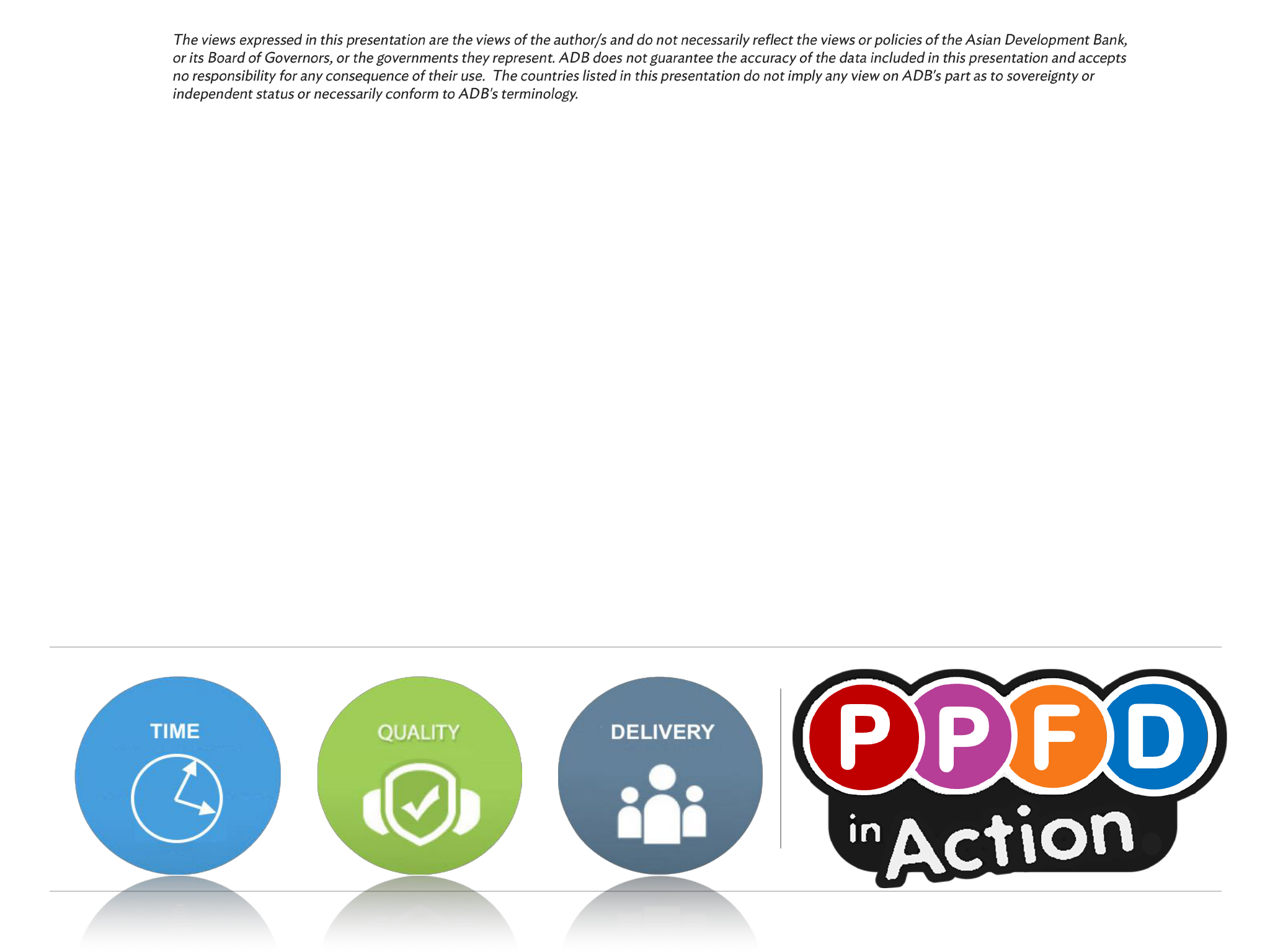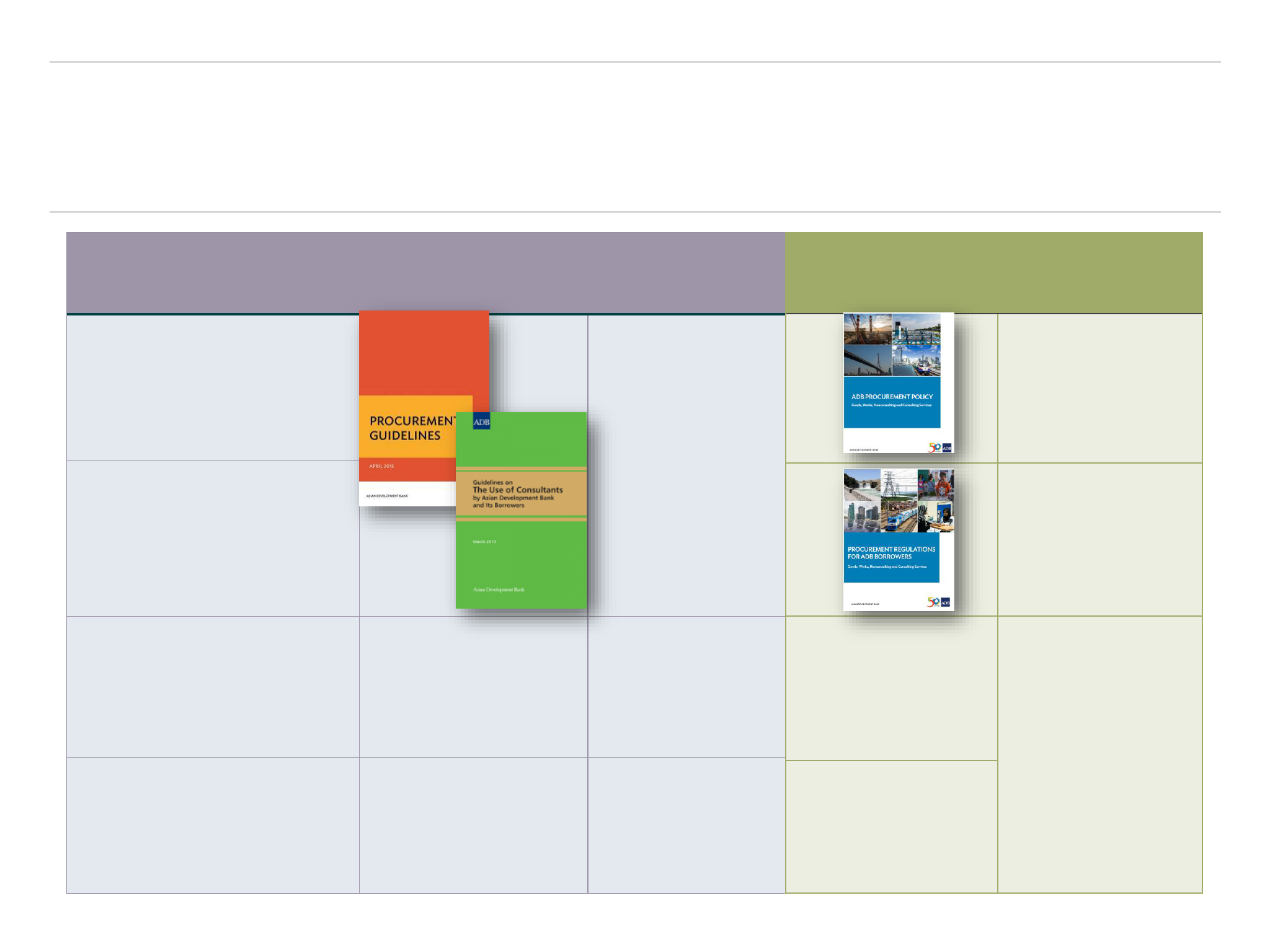
ADB Procurement
Reforms
1

Agenda
i. Concept of the Reform
ii. Implementation Plan
iii. Expected Benefits
2

i. Concept of the Reform
3

Drivers of ADB Procurement Reforms
1. Increased lending operations
2. Evolving needs of Developing Member Countries
3. Harmonization with Multilateral Development Banks
4. Need to improve procurement delivery systems
4

ADB Procurement Cycle
5

6
• Risk Assessment
identifies and assesses
project risks through
the procurement
process, transition-in,
execution and
transition-out
• Mitigation measures
specified
Procurement
Risk
Framework
Procurement
Planning
Project
Execution
Procurement
Principles
Risk
Identification
Risk
Management
• Risks are managed via
the procurement
arrangements (i.e.
procurement method,
contract structure,
contract terms,
performance
measures, etc.)
• Risk monitoring
• Communication Plan
Bidding and
Selection
• Contract
Management Plan
takes risks from the
revised assessment
that are to be
managed during
project execution,
and the
corresponding
mitigation measures
• Contract
Management
includes monitoring
and managing risks in
the contract
management plan
and any other
issues/risks that occur
during execution
• Risk Assessment
revised to reflect any
new or altered risks or
risk mitigations arising
as a result of bid
responses, the
proposed solution or
contract negotiations
• Identification of any
new risks that arise
during project
execution
Risk Based Procurement Approach

Old vs. New
Category Old
Approval
Procurement
Policy
Board
Procurement
& Consulting
Procedures
Staff
Instructions
President
Bidding
Documents
OSFMD
Project
Administration
Instructions
(PAI 2 & 3)
New
Approval
Board
President
DG
OSFMD
• Staff Instructions
(Procurement of
Goods, Works,
Nonconsulting &
Consulting Services)
• TA Staff Instructions
• Guidance Notes
• Standard
Procurement and
Consulting documents
Standard
Procurement and
Consulting
documents
7

Old vs. New
Category Old
Approval
Procurement
Policy
Board
Procurement
& Consulting
Procedures
Staff
Instructions
President
Bidding
Documents
OSFMD
Project
Administration
Instructions
(PAI 2 & 3)
New
Approval
Board
President
DG
OSFMD
• Staff Instructions
(Procurement of
Goods, Works,
Nonconsulting &
Consulting Services)
• TA Staff Instructions
• Guidance Notes
• Standard
Procurement and
Consulting documents
Standard
Procurement and
Consulting
documents
8

New Procurement Principles
Economy
Efficiency
Fairness
Transparency
Quality
Value for money
Existing
New
9

How principles work together
10
Value for Money
Is the effective, efficient and economic use of resources, which requires an evaluation of relevant costs and benefits
along with an assessment of risks, non-price attributes and/or total cost of ownership as appropriate.
Efficiency
Quality
Flexibility
• Decreased transaction costs
• Increased skills
• Increased HLT usage
• Improved procurement planning
• Support and encouragement of e-
procurement systems
• Contract management support
• Prompt resolution of complaints
• Improved developing member
countries procurement process
• Improved procurement planning
• Governance
• Contracts with clear
performance criteria
• Minimal number of complaints
• Improved ADB processes
• Open competitive bidding
• Decentralization
• Accreditation APA
• Principles based decisions
• Improved procurement planning
• Delegation
• Tenders with weighted proposal criteria
Transparency
Fairness
Transparency

Risk-Based Oversight
Procurement Principles
Prior Review
Procurement audits
Post Review
(sampling)
Trust and Verify
Procurement Review
Upfront assessment
ADB procedures
11

Decentralized Procurement Support
Transaction focus End to end support
12

ii. Implementation Plan
13

Rollout of the new framework
❖ New Investment Lending projects:
❖ Applies to all projects with concept notes approved on or after 1
July 2017;
❖ Projects under preparation:
❖ Quality assurance meeting scheduled on or after 1 October 2017;
❖ Regional Departments, in consultation with OFSMD, will review
based on request by borrowers for use of the new framework;
❖ Projects under implementation:
❖ Regional Departments, in consultation with OFSMD, will review
based on request by borrowers for use of the new framework;
❖ Only procurement transactions to be initiated after 1 October
2017 will be considered.
14

iii. Expected Benefits
15

Key features
❖ Use of a less-prescriptive, more principles-based procurement
policy to meet the emerging needs of ADB clients and changing
market conditions;
❖ Adoption of fitness for purpose as the operational model in
designing project procurement arrangements;
❖ Use of risk-based procurement review approaches in order to
improve operational efficiencies;
❖ Support for the procurement of high-level technologies,
particularly to help developing member countries address
climate change and meet other growth aspirations; and
❖ Use of alternative procurement arrangements to reduce
transaction costs for developing member countries and ADB’s
cofinanciers.
16

Expected Benefits
1. Reduced procurement time, improved quality and
delivery systems
2. Faster implementation of ADB-financed projects
3. Greater engagement with DMCs
4. Lower transaction costs in co-financing
5. Fiduciary comfort throughout the project cycle
17

For more information
https://www.adb.org/documents/adb-procurement-policy
https://www.adb.org/documents/procurement-regulations-
adb-borrowers
18
